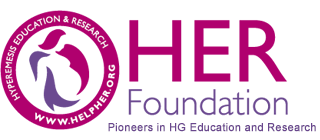Therapeutic Abortion
Abortion in most cases of HG is unnecessary due to the treatment options now available. However, ineffective or inadequate care too commonly causes women to face the difficult decision of aborting a wanted pregnancy. At least 10% of pregnancies complicated by HG are terminated and many more are almost terminated out of desperation. Nearly half of these women terminate more than one pregnancy. (HER Foundation FRS Survey) The HER Foundation is working to improve care for women with HG to decrease the number of women facing this unwanted decision.
Early intervention with effective medications can often prevent the need for abortion. Unfortunately, the medications most effective for HG are those that have the least amount of research and do not have a long history of use in pregnancy. Many practitioners are hesitant to use them, especially with their high cost. However, the risks to both mother and child long term, as well as the cost of the resulting complications and hospitalization can be greater. Women left untreated sometimes become so metabolically imbalanced, termination is chosen to save the life of the mother who is facing organ failure. In other cases, the mother and child are put at higher risk for serious and potentially life-long complications. However, as a treatment option, therapeutic abortion should be considered only as a last resort.
The numerous potential adverse effects of abortion cannot be overlooked or underestimated. It is well-known that there are physiological and psychological repercussions for abortions, and these increase in women with repeat abortions. Aborting a wanted child can create debilitating, long-term psychological impact. Read stories of women who terminated due to HG on the Shadowlands forum, view resources for support, and visit the HER Grief Forum.
Offsite Research:
Nausea and vomiting of pregnancy.
Broussard CN, Richter JE.
Department of Gastroenterology, Cleveland Clinic Foundation, Ohio, USA.
Gastroenterology Clinics of North America 1998 Mar;27(1):123-51.
NVP is a spectrum of disorders ranging from the physiologically typical mild to moderate nausea and vomiting that is usually self-limited, to the pathologic, intractable symptoms of hyperemesis gravidarum that are associated with metabolic and electrolyte disturbances and weight loss. Up to 90% of pregnant women experience NVP. The pathogenesis remains poorly understood with multifactorial theories proposed combining both biologic and psychological factors. Diagnosing this syndrome is straightforward, but other organic sources should be excluded when symptoms are severe or prolonged. The overall prognosis is excellent for typical NVP, but whether hyperemesis gravidarum increases the risk to the fetus is controversial. Initial management should be conservative, including reassurance of the transient nature of the symptoms and the good prognosis, in addition to dietary modifications. Pharmacologic therapy is reserved for patients with persistent symptoms and is appropriate after discussion of the risks and benefits with informed consent. Alternative treatments, including psychotherapy and other non-pharmacologic modalities, are less proven but potentially safe and effective, thus providing additional therapeutic options. In refractory cases, nutritional supplementation becomes life-saving for both the mother and the fetus. Therapeutic abortion is a rare and last resort, to be used only when maternal life is threatened.
The association between abortion and nausea and vomiting of pregnancy
Paolo Mazzotta, Laura Magee, Gideon Koren
Therapeutic abortions due to severe morning sickness: an unacceptable combination.
Mazzotta P, Magee L, Koren G
(website: http://www.motherisk.org)
The Motherisk Newsletter, 6: 1-3, 1996.
Updated on: Sep. 15, 2022




 The Chronicles of Nausea
The Chronicles of Nausea Beyond Morning Sickness
Beyond Morning Sickness